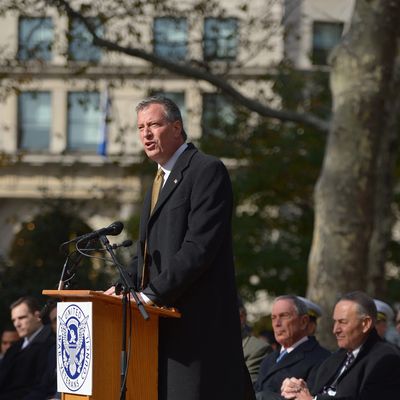
For sheer histrionics, it will never come close to the showdown over charter schools between Eva Moskowitz and Mayor Bill de Blasio. For house-and-home urgency, it doesn’t approach the need for the administration to install a leader of “Build It Back,” the floundering Sandy-recovery program with 19,000 applicants and zero completed repairs. But the ongoing search for a new parks commissioner is an intriguing test of the larger de Blasio progressive experiment.
The mayor is not going to turn Central Park into a kale farm collective. Yet during the 2013 campaign, de Blasio cited the drastic contrasts in the physical conditions of parks as another illustration of his “Tale of Two Cities.” And he supported a proposal by state senator Daniel Squadron to force the thriving private parks conservancies to send 20 percent of their operating budgets to a fund for needier parks.
The tithing notion appears to be complicating the search for a new commissioner. De Blasio’s transition team was soliciting additional names as recently as last week. “Everyone knows the mayor’s agenda on inequality in general, but with other jobs that are still open, you can have a broad conversation if you’re a candidate,” a government insider says. “With parks, there’s only this one policy position that’s been articulated. You’d have to get through that gate. That’s a hard conversation.”
The conservancies filled a void after the ‘70s fiscal crisis, when the parks were allowed to deteriorate, and in some ways, they’ve done their job too well: As wealth swelled in the Bloomberg era, donors rained money on the marquee parks, with John Paulson’s $100 million gift to Central Park highlighting the disparities. Other green spaces and playgrounds, dependent on the Parks Department’s threadbare finances, are falling apart.
De Blasio is right to try to re-balance the public-private equation. But he needs to do it more nimbly than he has so far with charter schools, where the battle with Moskowitz has obscured his more nuanced and open-minded views on charters in general. Requiring conservancies to redirect some of their cash would probably set off a legal fight. A de Blasio adviser says the mayor is staunchly committed to treating all parks fairly, but is undecided on the mechanism. “We understand the political landscape has changed,” one conservancy leader says. “So we’re already discussing how to help smaller parks more.”
The names of logical candidates have been circulating for months — from state parks commissioner Rose Harvey to Mitchell Silver, currently the director of city planning in Raleigh, North Carolina. The Staten Island borough president, James Oddo, has suggested Adena Long, currently the department’s borough head.
Liam Kavanagh, a Bloomberg holdover, has been doing an adroit job as acting commissioner. Meanwhile, three key deputy parks commissioner slots have been vacant for months, and spring is coming, kicking off the department’s busiest stretch. “We always viewed St. Patrick’s Day as the beginning of the operating season, because that’s the first big parade of the year you need to clean up after,” a former parkie says. “After that, it’s almost too late to replace key operating people — you can’t screw up getting the pools and beaches open.” Especially after this very long winter, and the mayor’s baptism by snowstorm.





























